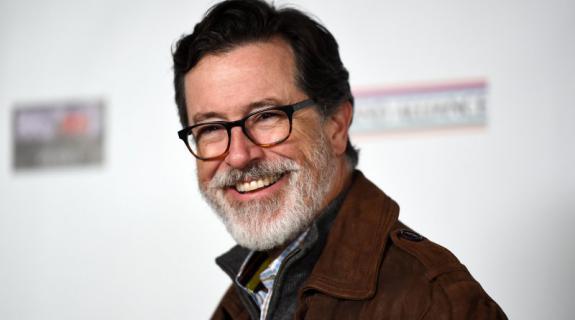Conservative pundit Stephen Colbert has made his mark on late-night TV on Comedy Central for years on The Colbert Report, making a fool out of himself as well as his guests in an intelligent, self-deprecating, endearing way.
But now that Stephen Colbert is gone, replaced by the new CBS version of Stephen Colbert, in which he basically loses the conservative pundit act in favor of his real personality.
As his Late Show debut nears, the question has become: Who is the real man?
The New York Times published a profile on Colbert leading up to his Sept. 8 premiere, calling him the “Late Night Hope.”
The picture the Times paints is one of a man in charge, who is comfortable being there. He and his band leader Jon Batiste will become the second team to take over CBS’ Late Show after David Letterman, leaving rather large shows to fill.
They’ll be competing against the very viral Jimmy Fallon and Jimmy Kimmel, both hosts who know how to create content in the digital age. But Colbert addressed the rivalry at this summer’s TCAs, saying that competition holds no appeal to him and he looks forward to sharing the time slot with them both.
The issue, as the Times sees it, is that Colbert will have to broaden his audience from the Comedy Central political viewers to the CBS viewership, which involves taking a look at the Stephen Colbert from the Report and seeing how he must change for The Late Show.
What Colbert and his writers room have found is that the two personas aren’t too far apart, and they have created online videos and a podcast all summer long in an attempt to further analyze that. The Times notes anecdotes from Jon Stewart, who called the real Colbert a lovely man, and former colleague Steve Carell, who said that he was perfect for a gig like The Daily Show because “it played into his strengths, academically and intellectually.”
Colbert started with Carell at Chicago’s Second City, learning how to make big stories out of very little, then went on to The Daily Show, leaving for a stint at Strangers with Candy before returning. His Strangers with Candy colleagues described him as one who naturally takes charge because people trust him to do so.
Somewhere in the middle of his run at The Colbert Report, he told the Times, he started to question how long he could sustain the brutal structure of the show, and decided before his contract expired in December that this year would be his last.
“I had to change, for my own growth,” Colbert said.
When Letterman announced that he would leave his show in April 2014, CBS’ Les Moonves had no official succession plan but when he became aware that Colbert would be available, jumped at the chance. And it didn’t hurt that he will be the sole person in late night with a solid background in politics with the 2016 election just around the corner.
Colbert plans on making the show his own in other ways, too, detailing the transformation of the theater in his summer-long podcast, adding plans for a segment called “Who Am Me?” where he interviews people from his own life about himself - a way to further distinguish the Comedy Central Colbert from the CBS Colbert.
Read more at The New York Times.
Brief Take: CBS has an extra piece of marketing luck with Colbert, which is the curiosity factor of finding out what Colbert will be like once he strips off his Colbert Report persona.
Tags:













































__twocolumncontent.jpg)











